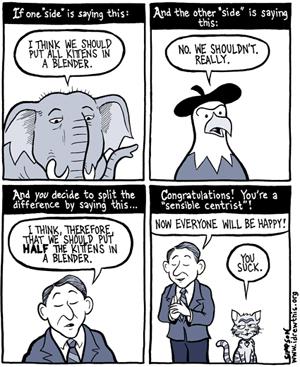Gordon Campbell on Peter Dunne’s casting vote on asset sales
Gordon Campbell on Peter Dunne’s casting vote on asset sales
As the late Roger Kerr pointed out in 2005, Peter Dunne went into the election that year advocating the 40% selldown of the government’s stake in most SOEs. So Dunne can hardly be accused of not being a consistent advocate of the partial privatisation model – he could more accurately claim that it was his idea in the first place.
Thus, the Greens are on very shaky ground in saying that Dunne doesn’t have a mandate to support the 49% selldown this year. In the end, that would turn on whether you regard Dunne’s stated opposition this year to the privatisation of water (which most people would see as opposition to the privatising of domestic water supplies) as also entailing an opposition to privatising the water used by hydro dams to generate electricity.
This year, Dunne strategy on assets sales was to present himself as the bulwark against the kind of total privatisation model we saw in the 1980s – which wasn’t being advocated by anyone but the Act loonies – and by contrast, to present his tacit support for the 49% selldown as (somehow) being a moderate alternative.
 That campaigning position was cemented
into place in his coalition agreement with the National
Party. As a “moderate” position, it’s a bit like
signing off to bring back hanging, but triumphantly drawing
a line in the sand against drawing and quartering.
That campaigning position was cemented
into place in his coalition agreement with the National
Party. As a “moderate” position, it’s a bit like
signing off to bring back hanging, but triumphantly drawing
a line in the sand against drawing and quartering.
Still, Dunne is not an easy politician to pigeonhole. He’s certainly not a moderate, or a moderating force. That part of his political persona has always been bogus, and never more so than in 2002 when the television worm enabled him to appear as the Mr Reasonable alternative to those radical extremists in the Greens. At which point, Mr Reasonable brought into Parliament a gang of religious extremists under the United Future banner, and was effectively held hostage by them for the next three years, morning prayer meetings and all.
While it is tempting to write Dunne off as a mere opportunist, that’s not entirely true either. Dunne supported Sue Bradford’s s59 Bill that outlawed violence in disciplining children, and has always supported a republican future for New Zealand, when neither cause would necessarily be popular with his Karori/Khandallah support base.
However, the Greens – and belatedly Labour – are being tactically astute in focussing on him as the holder of the casting vote. It is not a moderate position to support the selldown of a 49% stake in the state’s energy companies and Air New Zealand, and foregoing the full flow of dividends from these publicly owned assets, forever. Nor is it a moderate position to collude in ramming through the first sale regardless of the state of a global economy that will play a large part in ensuring the public get the best price for the assets.
In sum, holding the line against a merely theoretical total sale, while colluding with the actual partial sell-off, is wilfully misleading if this is being presented as a moderate, centrist position. Dunne’s is being National’s flunkey on asset sales, however he tries to dress up the collusion.
Brazil oil spill (cont’d)
Those still concerned about the future deep water
drilling activities of the Brazilian oil giant Petrobras off
East Cape – and still sceptical of the Key government’s
assurances that industry best practice will be followed –
may be interested in the (lack of) progress with the current
oil spill caused by deep water drilling off the coast of
Brazil.
Since I mentioned this spill a couple of weeks ago, the efforts in staunching it have been….highly unsuccessful as this article indicates.
Nearly a month after the start of the offshore oil spill, authorities in Brazil have not yet been able to determine the causes of the accident, how much oil was leaked at a Chevron platform, the size of the oil slick, or the extent of the environmental damage. In the midst of contradictory and scarce information, fears over the environmental risks posed by the technologically-challenging exploitation of the country's massive "pre-salt" oil reserves – buried under thick layers of sand, rock and salt – are growing.The most alarming warning inadvertently came from the U.S.-based Chevron itself, which operates the well where the accident occurred, at a depth of 1,200 metres in the Frade field, 370 km off the coast of Rio de Janeiro. The president of Chevron for Africa and Latin America, Ali Moshiri, told the press that "we are dealing with Mother Nature, and she is complicated," the Agência Brasil government news agency reported.
Ah, so that’s what ‘industry best practice’ means. Wringing your hands and lamenting that Mother Nature is complicated. Thought so.


 Martin LeFevre - Meditations: Animal Encounters During Meditative States
Martin LeFevre - Meditations: Animal Encounters During Meditative States Ian Powell: Gisborne Hospital Senior Doctors Strike Highlights Important Health System Issues
Ian Powell: Gisborne Hospital Senior Doctors Strike Highlights Important Health System Issues Keith Rankin: Who, Neither Politician Nor Monarch, Executed 100,000 Civilians In A Single Night?
Keith Rankin: Who, Neither Politician Nor Monarch, Executed 100,000 Civilians In A Single Night? Eugene Doyle: Writing In The Time Of Genocide
Eugene Doyle: Writing In The Time Of Genocide Gordon Campbell: On Wealth Taxes And Capital Flight
Gordon Campbell: On Wealth Taxes And Capital Flight Ian Powell: Why New Zealand Should Recognise Palestine
Ian Powell: Why New Zealand Should Recognise Palestine